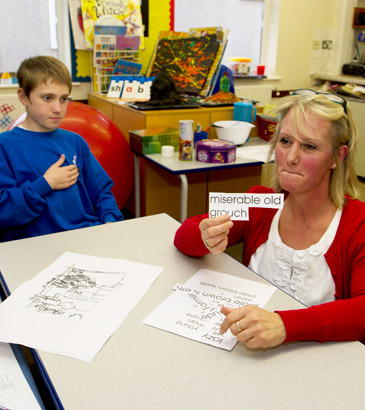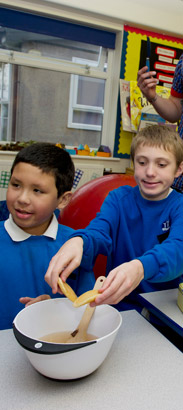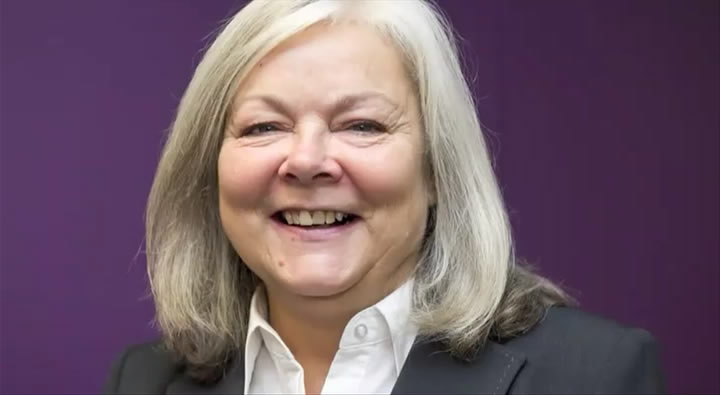
Research ... is not distant from practice, but its lifeblood. It feeds the cycle of reflection / evidence / evaluation / teaching and learning. It's what excellent teachers do.
CLDD Project, 2011School-based inquiry is not always reported in the wider educational arena, but discussion within schools through departmental or whole school staff meetings is highly beneficial. Blending research into professional development can make a significant difference for teachers and school development, as well as improving outcomes for pupils with SLD/PMLD/CLDD.
Listen to Jane Headland, headteacher of Brookfields School in Berkshire, talk about how research has become embedded in her school's practice.

Professional development for teachers is high on the government agenda, and evidence-based practice is a compelling force within school improvement.
Research within classrooms or schools can be shaped to meet the setting's own needs and include curriculum development, pupil engagement, the learning needs of pupils, and many other issues.
By choosing to research some facet of our professional world (for example, identifying the needs of a child with a rare disorder) we can generate knowledge and understanding which translates into more effective practice.
In some schools, research is embedded in classroom teams. A deputy head teacher comments:

We have introduced a research target for teaching assistants as part of their professional development each year. It's up to the class staff to decide in conjunction with the teaching assistant what they're going to research, but, for example, some have been researching more about the child's disability or ways of motivating them. There is an increasing number of teachers doing their Masters in education now. ...

...School supports them through that. It increases our knowledge, which we can then share as well; not only within school, but with ... [visiting students and] our local education centre.

There are many professional journals and magazines that focus on issues and research in special education. However, subscriptions are usually expensive and therefore access is limited. Some local universities may allow read-only access to their libraries for educators; and local libraries can order articles for a fee through the inter-library loan system.
Professional reading is essential to remaining at the cutting edge. Consider how you may involve others and share research reading and discussion in a focused way.
Read the document, noting the sections that are related to this module (labelled '4.4'). Select one of the areas and draw up a plan showing how you would address this in the context of developing the inquiry-based practice in your school.

Whitehead, M. and Hartley, D. (eds) (2005) Major Themes in Education: Teacher education. London: Routledge/Taylor Francis.
In addition, you might also be interested in reading one or more of the following books to support Level D:
Bell, J. (2010) Doing Your Research Project: A Guide for First-Time Researchers in Education, Health and Social Science. Maidenhead: Open University Press.
Blaxter, L., Hughes, C. and Tight, M. (2006) How to Research (3rd edition). Buckingham: Open University Press.
Carpenter, B. and Egerton, J. (eds) (2007) New Horizons in Special Education: Evidence-based practice in action. Clent: Sunfield Publications.

Cryer, P. (2006) The Research Student's Guide to Success (3rd edn). Buckingham: Open University Press.
Denscombe, M. (2002) Ground Rules for Good Research. Maidenhead: Open University Press.
Denscombe, M. (2010) The Good Research Guide for Small Scale Social Research Projects (4th edn). Maidenhead: Open University Press.
Jones, P., Whitehurst, T. and Egerton, J. (eds) (2012) Creating Meaningful Inquiry in Inclusive Classrooms: Practitioners' stories of research. London: Routledge.

Porter, J. and Lacey, P. (2005) Researching Learning Difficulties: A guide for practitioners. London: Paul Chapman.
Roberts-Holmes, G. (2011) Doing Your Early Years Action Research Project: A step by step guide (2nd edn). London: Sage.
Robson, C. (2011) Real World Research (3rd edition). Oxford: Blackwell.
Rose, R. and Grosvenor, I. (2001) Doing Research in Special Education: Ideas into Practice. London: David Fulton.
Also, visit the National Foundation for Educational Research site.
